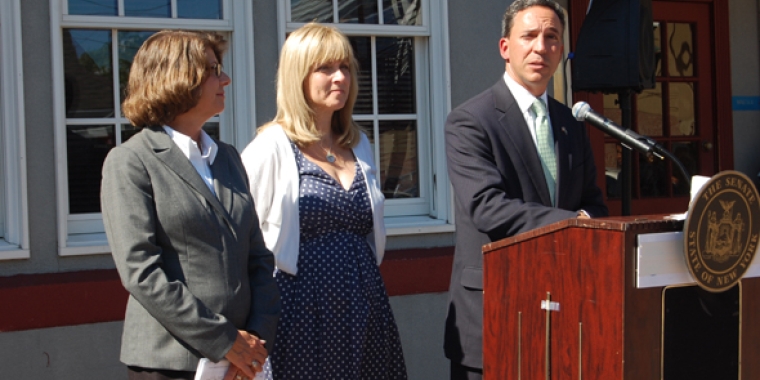Anton Newspapers: Senator Martins Holds Roundtable, Press Conference

By Rich Forestano
Coming into the final four months of his current term as senator of the 7th Senate District, Jack Martins sat down with Anton Community Newspapers editors on Wednesday, July 25. He will seek re-election in November, facing off against Manhasset Democrat Daniel Ross.
Martins “tipped his hat” to Governor Andrew Cuomo concerning initiatives including the new 2 percent tax cap, a timely budget process, the states dealings concerning the Metropolitan Transit Authority (MTA) and state school district issues, most notably unfunded mandates.
New York State passed its second consecutive on-time budget. Before 2011, the state hadn’t produced an on-time budget in 15 years. The current budget represents the fourth on-time budget in 29 years.
“People may say ‘so what? You actually passed a budget on-time,’” Martins said. “It hadn’t been done in decades and to actually get two years in a row is important. It shows that schedules matter, rules matter and timelines matter. We should hold ourselves to that standard.”
The $132.6 billion spending plan limits all-fund spending growth to 1.9 percent. According to Martins, this is the second year in a row that state-spending growth is less than the 2 percent spending cap placed on local governments and school budgets. The budget reportedly reduces next year’s budget deficit to $950 million. “We should be aware that we have an obligation to reduce spending,” he said.
The MTA
The MTA and its payroll tax, a tax enacted in 2009 to help bail out the cash-strapped transit agency, has been a thorn in the side of businesses and school districts. The legislature passed the Middle Class Tax Cut and Job Creation Bill recently, which reduces MTA tax for some 290,000 businesses in the 12-county MTA region with annual payrolls ranging from $10,000 to $1.25 million, approximately 78 percent of businesses are currently paying the tax.
Another 6,000 businesses with payrolls from $1.25 million to $1.75 million will see tax cuts of one-third to two-thirds. Schools, both public and non-public, would be exempt from the MTA payroll tax.
“We were able to repeal, for the most part, the MTA payroll tax,” Martins noted. “Did it go as far as we wanted it to go? Frankly, No.”
Local fire districts are still burdened by the tax and local villages and larger libraries and certain not-for-profits and hospitals.
“The idea that we have municipal entities who rely on property taxes to provide basic services to the local community but are being asked to take monies from those basics services and subsidizing the MTA…it doesn’t make any sense. There are still steps we need to take. It’s not going to happen overnight and there is still significant push back concerning the MTA.”
The $14 billion transit authority has borne the brunt of much criticism and scrutiny when it comes to fiscal responsibility over the last few years. With the MTA stalling fare increases until March, residents and local officials have raised multiple questions and concerns.
“Should we not expect the MTA to tighten its belt and find the kind of efficiencies that they should find in order to remove that obligation from Nassau County that pays millions of dollars to this MTA payroll tax?,” Martins said.
The Mineola native, along with Assemblywoman Michelle Schimel and Long Island Rail Road (LIRR) President Helena Williams held a press conference last Wednesday announcing the MTA would extend the validity period for one-way and round-trip LIRR tickets from two weeks to two months. The refund period would be extended from one month to two months.
The $10 processing fee however, is still in effect. Martins and Schimel have introduced legislation to repeal the highly criticized fee.
“I am pleased the MTA listened to the concerns and took action to address them,” Martins said. “This plan is another positive step toward improving customer service for riders and I applaud the MTA for changing the policy.”
A member of the Assembly Transportation Committee, Schimel said, “The MTA is doing the right thing. By extending the time frame for ticket validity and refunds they are sending the right message to our suburban commuters. The LIRR is listening and showing respect for their mass transit customers.”
According to the MTA, the processing fee will remain in effect to cover administrative costs. “We’re pleased that the cost containment efforts of our commuter railroads, combined with increased ridership, make it possible to broaden our ticket validity and refund policies to further benefit Long Island Rail Road and Metro North customers,” said MTA Chairman Joseph J. Lhota. “This benefit will cost the railroads $6 million, but combined with the expanded service investments announced last week, shows the MTA’s commitment to customer service.”
The MTA is counting on a 7.5 percent fare increase next year, union givebacks and steady aid from the state to bridge budget gaps for the next several years, according to its adjusted mid-year budget for 2012 and preliminary draft of the agency’s 2013 budget. Those hikes could surpass 7.5 percent in 2015.
The agency will end this year with a $153 million deficit if labor givebacks do not materialize and could go to more than $500 million by 2016, despite the budget indicating the MTA would have a surplus in 2012 and 2013.
Unfunded Mandates
The topic of unfunded mandates hindering school districts is nothing new. Martins told Anton editors that there is a total of $20.4 billion in aid to education, including a four percent increase in school aid from last year’s budget.
According to Martins, school districts are eligible to receive state aid to offset costs related to implementing the Annual Professional Performance Reviews for teachers and principals. If a school district does not implement the new APPR by January 2013, it forgoes its share of an $805 million increase in school aid planned for this year.
“People ask all the time ‘are you willing to do anything to repeal the tax cap…and I’m not,” Martins affirmed. “I think the tax cap is a positive thing. I think it’s necessary. I think it’s an important tool.”
Partnership for Assessment of Readiness for College and Careers (PARCC) received a $186 million grant through the U.S. Department of Education’s “Race to the Top” assessment competition to support the development of a “next-generation assessment system.” The Regents exam, New York’s state testing module for students, may become a thing of the past.
“The costs to our local school districts…they’re going to spend $250,000 implementing new rubrics. It’s absurd,” Martins said. “I introduced a bill that didn’t pass this year that would have exempted the top 10 percent of the school districts from changing their model. If you have school districts that are already on top, shouldn’t we recognize that?”
States that won the Race to the Top money were tasked to make a test that lines up with the new common core, which makes those 42 states use the same assessment. Martins stated that he’d continue to push this bill to exempt high performing school districts from changing its teaching model.
“The state is funding education to the tune of $1.5 billion over these two years in light of the tax cap,” Martins stated.
Concerning uncontrollable costs, like pensions and health care which school districts, municipalities and the like are continuing to go up, Martins feels the pension system in New York State is, “inversely set up to allow our school districts and municipalities to meet their pension requirements. What I mean by that is precisely when we are least able to pay, we are required to pay more.”
Martins sat on the Mandate Relief Task Force, an 11-member council charged with reviewing proposals to reduce burden on local governments and school districts. Cuomo signed the law creating the Mandate Relief Council as part of a package that reportedly would save local governments and school districts more than $125 million. Secretary to the governor, Lawrence Schwartz, is the chair of the task force.
According to Martins, not one meeting has taken place between members of the task force dating back to June.
“The meetings are convened at [Schwartz’s] call,” Martins said. “I sent him two letters asking to have those meetings to no avail. Often times we speak about mandate relief, I would have loved to have a meeting. Whether we would have approved anything or not, at least we would have had the opportunity to discuss the issues that came up during the [public] hearings.”
Calls to Schwartz’s office went unreturned.
I-STOP Prescription Drug Legislation
The I-STOP legislation, creating a real-time database that gives physicians information on a patient’s prescription history before prescribing the most powerful and addictive drugs, will require pharmacists to provide information for that purpose and reclassify pills to reflect the risk of abuse that comes with their use. The bill also establishes a safe drug disposal program for expired or unused medication.
“I think the I-STOP legislation was the signature piece of legislation of our session,” Martins stated. “We have a prescription drug epidemic in New York State. It’s a national issue, but nowhere is it more prevalent than in New York.”
Approximately 21 million prescriptions were written for oxycodone in New York State in 2010, according to Martins. “What I commonly refer to is legalized heroin,” Martins said of oxycodone.
